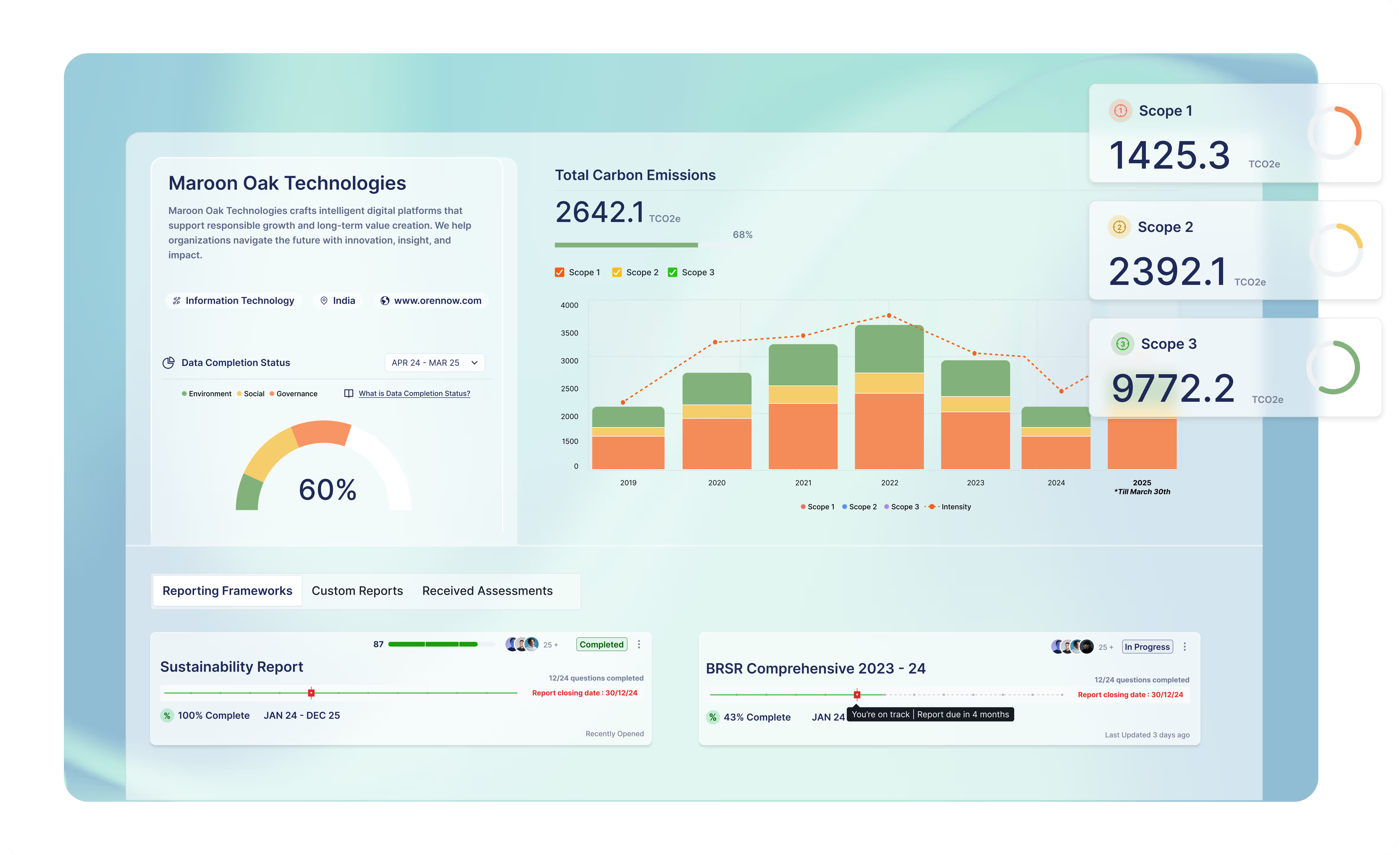Why Limiting Your ESG Goals to Compliance Could Be Risky for Your Business

Navigating ESG Compliance Challenges: A Strategic Approach to Reporting and Risk Management
Environmental, Social, and Governance (ESG) compliance is a dynamic and increasingly critical aspect of corporate strategy worldwide. As the expectations around ESG disclosures intensify, companies face significant challenges in balancing accurate reporting with risk management. Without robust data management practices, ESG reporting can become a precarious endeavour, potentially leading to operational inefficiencies and reputational damage. This article explores the key risks associated with ESG reporting and offers strategies to mitigate these challenges effectively.
Understanding ESG Reporting Frameworks: Challenges in Selection, Adherence, and Data Management
The complexity of ESG reporting stems largely from the plethora of available frameworks. Companies are often overwhelmed by the need to comply with industry-specific and regional ESG standards, which vary significantly in scope and requirements. For instance, the oil and gas sector faces stricter carbon emissions regulations compared to the logistics and supply chain industries. This disparity underscores the importance of a thorough analysis by industry experts and data analysts to ensure compliance and minimise risk.
Moreover, over 85% of companies globally utilise multiple ESG reporting frameworks, which exacerbates the challenges of maintaining consistency and accuracy across disclosures. Inconsistent or incorrect data can be easily detected, posing a serious threat to a company’s credibility. Therefore, selecting the appropriate framework and managing the data effectively is crucial for mitigating these risks.

The Impact of Evolving ESG Regulations on Sustainable Financial Disclosures
The regulatory landscape for ESG reporting is constantly evolving, which adds another layer of complexity for companies striving to meet sustainable financial disclosure requirements. For example, the Sustainable Finance Disclosure Regulation (SFDR) introduced in March 2021 mandates financial market participants to disclose 18 mandatory and two optional indicators. Additionally, the Non-Financial Reporting Directive (NFRD) has been replaced by the Corporate Sustainability Reporting Directive (CSRD), effective from June 2022, further intensifying the regulatory pressure on companies.
These regulations, primarily originating in the European Union, have far-reaching implications for global businesses. Companies engaging in international deals, particularly those involving EU entities, must navigate both EU and domestic ESG standards. Any shortcuts in initial sustainability reporting can lead to significant challenges in future disclosures, particularly when aligning with evolving frameworks like the CSRD.

Global Compliance Challenges: Harmonizing EU and Domestic ESG Standards
The interplay between EU and domestic ESG standards presents a significant challenge for companies operating in international markets. For instance, an Indian company entering into a trade agreement with a European counterpart would be required to comply with both EU and Indian ESG standards. This dual compliance obligation can be particularly daunting, especially when the reporting frameworks differ significantly.
From a compliance perspective, it is crucial for companies to establish a robust reporting framework from the outset. Failure to do so can lead to inconsistencies in disclosures over time, creating complications when aligning past reports with current regulatory requirements. This challenge is particularly pronounced in industries with complex supply chains, where upstream and downstream impacts must be meticulously documented.

Quantifying Sustainability: The Compliance Challenge with ESG Indicators
One of the most significant challenges in ESG reporting is the quantification of sustainability, which often involves translating qualitative metrics into quantifiable indicators. Companies struggle to identify which environmental, social, and governance indicators are most relevant for accurate financial disclosures. This challenge is compounded by the need to quantify risks and sustainable activities, which often require substantial investment in data management and analysis.
Consulting firms play a pivotal role in helping companies navigate these challenges. By analysing millions of data points, consultants can identify the key ESG risks and determine the appropriate metrics for reporting. For example, tracking carbon emissions from business air travel over the past decade can provide insights into a company's progress towards achieving net-zero emissions, a critical aspect of ESG reporting.

The Critical Role of Consultancies in ESG Data Management and Risk Mitigation
Effective ESG reporting hinges on robust data management practices, which are essential for identifying and mitigating compliance risks. Industries with high environmental impact, such as oil and gas, are increasingly integrating ESG considerations into their core operations. In contrast, sectors like real estate may prioritise ESG reporting from a compliance standpoint, focusing on immediate requirements rather than long-term integration.
Consultancies are instrumental in helping companies manage these risks by providing expert analysis and data management solutions. By leveraging their expertise, companies can ensure that their ESG reporting is both accurate and aligned with regulatory expectations. This approach not only reduces the risk of non-compliance but also enhances the credibility of the company’s sustainability efforts.

Conclusion: Strategic Approaches to ESG Compliance
Navigating the complexities of ESG compliance requires a strategic approach that balances accurate reporting with effective risk management. Companies must carefully select the appropriate ESG frameworks, stay abreast of evolving regulations, and invest in robust data management practices. By doing so, they can mitigate the risks associated with ESG reporting and enhance their overall sustainability performance. As the ESG landscape continues to evolve, companies that proactively address these challenges will be better positioned to succeed in an increasingly compliance-driven market.





